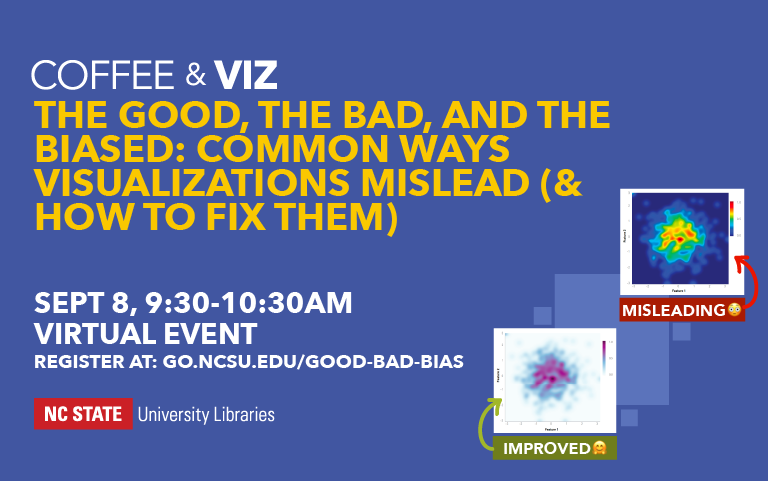
Coffee & Viz returns to the Libraries Sept. 8

Coffee & Viz returns to the Libraries Sept. 8
The best in visualization returns to the Libraries this fall with the Coffee & Viz series. The engrossing series in the Hunt Library’s Teaching and Visualization Lab showcases the unique ways that researchers at NC State and elsewhere are using visualization to enhance their scholarly work.
Coffee & Viz events are free and open to the public; registration is required. The first event of the fall semester is virtual; the subsequent events are in-person and will have complimentary coffee, tea, and light refreshments available beginning at 9:15 a.m. in an adjacent space. To help increase the sustainability of this program, please bring your own coffee mug.
To watch videos of past Coffee & Viz events, visit the Libraries’ Think and View page. To receive email updates about Libraries’ events, subscribe to our events newsletter.
The fall 2023 Coffee & Viz schedule is as follows:
The Good, The Bad, and The Biased: Common Ways Visualizations Mislead (and How to Fix Them)
Friday, Sept. 8, 9:30-10:30 a.m., online
Visualizations allow people to readily analyze and communicate data. However, many common visualization designs lead to engaging imagery but false conclusions. By understanding what people see when they look at a visualization, we can design visualizations that support more accurate data analysis and avoid unnecessary biases.
Join UNC Computer Science Assistant Professor Danielle Szafir as she walks through examples of commonly misleading practices, deconstructs how they lead readers astray, and discusses alternative practices that more faithfully communicate patterns in data. She will also discuss ongoing research from the UNC VisuaLab that explores ways to make data visualization more useful.
AI Image-Generation and its View of Gender
Friday, Sept. 15, 9:30-10:30 a.m., Hunt Library, Teaching and Visualization Lab
AI art continues to generate controversy, from arguments that it steals the work of digital artists to the inherently coded bias in its data models that users then reinforce. Given this bias, it could be inferred that AI image generators, such as DALL-E and Midjourney, produce images that enforce the gender binary. However, AI art programs and other forms of mechanical vision, such as image analysis, also have the potential to interrogate how society constructs gender.
Join Ph.D. student Travis R. Merchant-Knudsen as they walk through their research project “Machinic Visions of a Glitched Binary: AI Image-Generation and its View of Gender.” By using image generations and image analysis programs, Merchant-Knudsen creates visualizations of transgender and non-binary bodies that deconstruct and “glitch” the gender binary.
Reshaping Urban Futures: Embracing Change and Resilience in the Face of Climate Challenges
Friday, Oct. 20, 9:30-10:30 a.m., Hunt Library, Teaching and Visualization Lab
Our cities' current layouts, transportation systems, and growth patterns have been shaped by historical processes dating back hundreds of years. For centuries, we have followed a status quo approach to urban planning and development. However, given the challenges posed by climate change, it is crucial to break away from this traditional path and envision a more resilient future. Geospatial modeling provides an exciting opportunity to explore and visualize alternative trajectories of growth that better align with the needs of a changing world. We can evaluate the tradeoffs between competing social and environmental needs while accounting for uncertainty in future conditions. In this talk, we will challenge the status quo by presenting alternative ways in which growing communities might adapt to the increasing threat of sea level rise and flooding. Join us as we explore the possibilities for a more sustainable, adaptive, and resilient future together.
Bugs in Motion: Insect Behavior Up-Close & in Slow-Motion
Friday, Nov. 17, 9:30-10:30 a.m., Hunt Library, Teaching and Visualization Lab
Most of the fastest animals on earth are arthropods. They swing their appendages, snap their jaws, and propel their bodies at incredible speeds, sometimes using spring-loaded mechanisms. But because of their small size and cryptic lifestyles, the behaviors of many of these fast-moving organisms have yet to be captured on video or described. Adrian Smith will present his work filming the behaviors of creatures such as trap-jaw ants, beetles, moths, springtails, and more. He will show footage and describe behaviors that reveal how remarkable these organisms are.